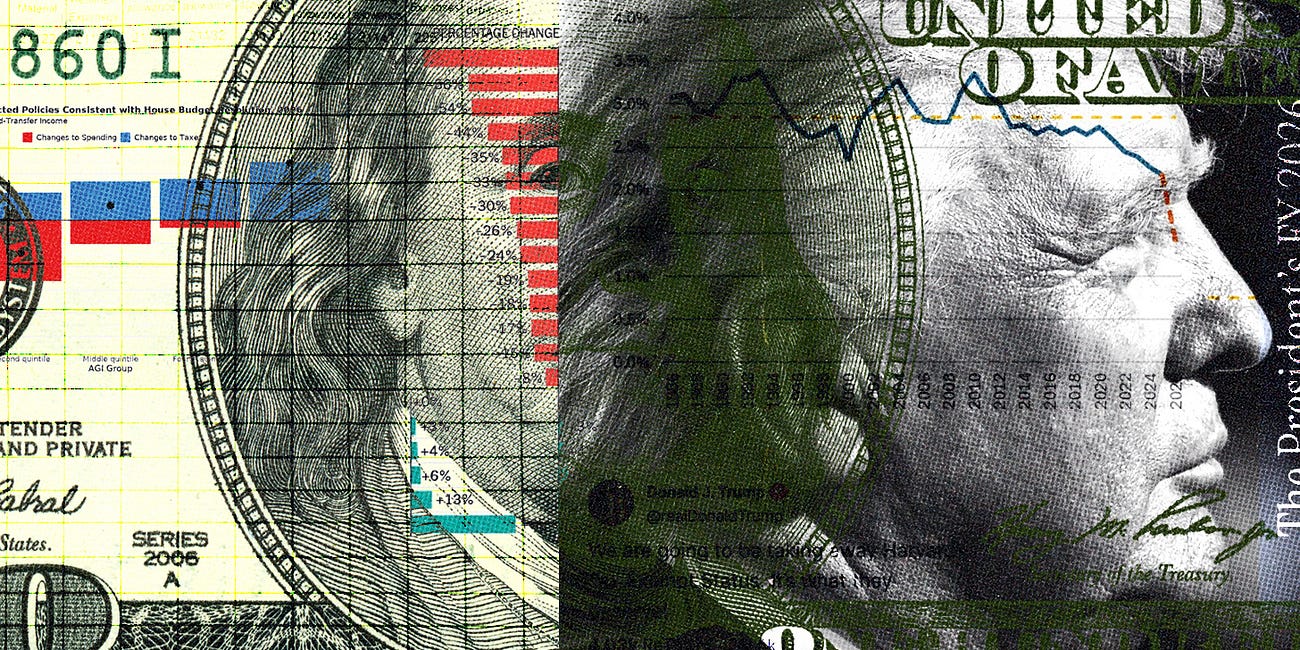|
 |
Thank you for being a free subscriber.. For all-access to Lincoln Square, and to help us amplify the content that you’re reading to Americans who aren’t paying attention, please consider upgrading your subscription today with this limited-time offer:
Hurry! offer ends soon!
'Draining the Swamp' Means Fixing the Debt
The so-called "One Big Beautiful Bill” is a masterclass in fiscal malpractice.
"Drain the swamp" has been a popular rallying cry in recent American politics. Too often though, it's nothing more than a slogan about rooting out corruption or punishing political elites. Yet, draining the swamp isn’t just about eliminating corruption, it’s also about removing the toxic mix of complacency and cowardice that fills the halls of American government with what Theodore Roosevelt would call, timid souls.
Moody's recent downgrade of U.S. government debt is akin to walking into your doctor’s office and being told you’ve gained too much weight, your blood pressure is off the charts, and your cholesterol is through the roof. Rather than confront the rising tide of federal debt threatening our very quality of life, Washington essentially responded to the doctor’s diagnosis by washing down their coney-dog pizza, with a moose tracks milkshake and a Founders KBS.
Debt doesn’t knock us out overnight. Like clogged arteries, its damage builds slowly. At first, it’s just a little more interest to pay. Then it becomes harder to fund new priorities. Over time, it crowds out private investment, saps economic growth, and ties the hands of future generations.
According to the Congressional Budget Office, the federal debt held by the public is projected to rise from 99 percent of GDP in 2024 to 116 percent by 2035 — a level not seen since the aftermath of World War II. By 2035, the federal government will be spending 30 percent of all tax revenue on interest payments, more than what we will be spending on national security or major programs like Medicaid and Social Security.
This is not a theoretical problem. This level of indebtedness is not just a number; it's a glaring indicator of fiscal irresponsibility.
You need only look at the “One Big Beautiful Bill” Act for a masterclass in fiscal malpractice. Less of a budget and more of a press release masquerading as policy, House Republicans patted themselves on the back for "getting something done," while conveniently ignoring the basic arithmetic of deficits and debt. The only thing gained by voting to increase the deficit by a projected $2.4 billion is to weaken America economically, strategically and generationally.
None of this has escaped international notice. Capital is becoming more cautious. Allies are hedging. Adversaries are emboldened. For all the strength of our markets and institutions, global confidence in America’s long-term trajectory is no longer a given. The cold hard truth is that America’s fiscal position is deteriorating, both relative to its history and to other countries.
This loss of confidence is not just about numbers; it's about credibility. The U.S. dollar's status as the world's reserve currency is built on trust in our economic stewardship. As that trust erodes, so does our influence.
For now, we can take comfort in knowing that, in the immediate future, there are no credible or scalable alternatives that can displace the dollar as the world's primary reserve and trade currency. Yet, history has no sympathy for great powers who thought they had forever.
If we don’t change course, borrowing costs will likely rise, slowing private investment and imposing economic costs; interest payments to foreign debtholders will expand, decreasing domestic income; pressure on the federal budget will intensify as debt service costs surge; and confidence in the dollar will fall as the risk of a fiscal crisis rises.
The path forward is challenging, and no one likes to change their lifestyle, but the alternative is far worse. If we want to avoid an economic heart attack, we need to stop ignoring the symptoms — and start treating the disease. That means tightening our fiscal belt, making hard choices, and demanding that the people we elect to office, regardless of partisan affiliation, start acting like responsible adults.
The question is not whether we should have debt — but how much, for what purpose, and under what limits. What we need is a clear-eyed commitment to responsible budgeting — one that identifies a realistic and sustainable target that keeps annual deficits within a range that is large enough to allow for public investment and counter-cyclical spending, but low enough to stabilize or reduce the debt-to-GDP ratio over time.
If Americans are serious about draining the swamp, they should focus on those elected officials guilty of committing fiscal mismanagement. Correcting the spending trajectory of the federal government may not be politically easy, but it is essential to the economic well-being of this generation of Americans and the next. Kicking the can down the road doesn’t avoid the heart attack — it just guarantees that the last word we’ll hear is “flatline,” courtesy of the disgusting abomination we allowed to bankrupt America.
You’re currently a free subscriber to Lincoln Square Media. For full access to our content, our Lincoln Loyal community, and to help us amplify the facts about the assault on our rights and freedoms, please consider upgrading your subscription today with this limited-time offer:


